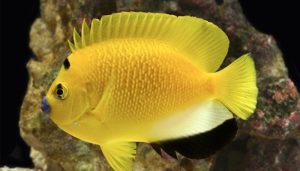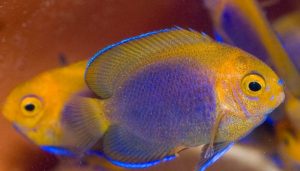Betta fish, also known as Siamese fighting fish, are beautiful and vibrant creatures that many aquarium enthusiasts adore. However, a common question arises among betta owners: can a betta fish live with other fish?
Contrary to popular belief, Betta fish can thrive alongside other fish, provided you select their tank mates thoughtfully. Not every fish is a good match for a Betta’s unique personality, but with the right companions, they can coexist peacefully in a lively, harmonious aquarium. Let’s dive into the key factors that ensure a happy, shared habitat for your Betta and its new neighbors!

Understanding the compatibility of bettas with various fish species is crucial for a peaceful aquarium environment. In this betta fish care guide, we will explore the intricacies of keeping bettas with other tank mates, best practices for housing them, and highlight fish species that can coexist harmoniously with these stunning fish.
So, can any other fish live with a betta? The answer isn’t as simple as yes or no—it depends on how carefully you plan their tank environment and choose compatible species.
Table of Contents
ToggleCan a Betta Fish Live with Other Fish?
Yes, a betta fish can live with other community fish, but it requires careful planning and consideration. Male bettas are known for their territorial nature and aggression, especially towards fish with long fins or those that display vibrant colors similar to their own.
This aggression can lead to fin nipping or stress among the tank mates, so it is essential to choose compatible species wisely. Female bettas, on the other hand, can sometimes be more sociable, particularly in a sorority setup where multiple females are kept together.
Nevertheless, creating an environment with enough space and hiding spots is crucial to reduce the chances of conflict among the different fish species.

Before adding new fish to the aquarium, it’s important to research each species’ temperament and ensure they are peaceful. Tank mates should ideally be small and non-aggressive fish, such as neon tetras or Rasboras.
Providing ample space—at least 10 gallons for a betta with tank mates—will help mitigate aggression and allow the fish to establish their territories.
Additionally, incorporating plants and decorations can provide hiding spots, making the fish feel more secure and reducing stress levels. Ultimately, a well-planned community tank can thrive, allowing a betta fish to live harmoniously with other fish.
3 Species of Fish That Live Happily With Bettas
When considering tank mates for your betta fish, there are several species that can coexist peacefully. One of the best choices is the corydoras catfish, which are bottom feeders and known for their friendly demeanor.
- Corydoras tend to stay near the tank bottom, avoiding direct confrontation with the betta, making them ideal companions.
- Another excellent option is the peaceful neon tetra; their small size and tranquil nature help prevent aggression, allowing them to swim freely without provoking the betta.
- Lastly, guppies can also be a good choice, particularly if you opt for males, as their bright colors can be attractive but won’t typically trigger aggressive behavior in bettas.
While these fish species can thrive alongside a betta, it’s essential to ensure that they have enough space to swim and hide. A school of at least five neon tetras or corydoras will help maintain a balanced environment, as they feel safer when live in groups.
When introducing new fish, always monitor the interactions carefully. If you notice any signs of aggression or stress, be prepared to separate the fish to maintain a peaceful aquarium. With the right planning and research, you can create a vibrant community tank where your betta and its companions can live happily.
Betta Fish Care: Can Two Betta Fish Live Together?
Keeping two betta fish together can be challenging. Male bettas are notoriously aggressive towards one another, and placing two in the same tank almost guarantees conflict, leading to physical harm or stress.
However, female bettas can sometimes coexist in a sorority, where a group of females is kept together in a larger tank. This arrangement requires careful attention to size, with at least 10 gallons recommended to prevent territorial disputes.
Additionally, providing plenty of hiding spots and plants helps mitigate aggression and allows the fish to establish their pecking order.
To successfully maintain a sorority of female bettas, it’s crucial to introduce them simultaneously to prevent territorial behavior from forming. Monitor their interactions closely during the first few weeks, as establishing the social hierarchy can be a delicate process.
If aggression arises, consider separating the most aggressive individuals to restore peace. In conclusion, while keeping two male bettas together is not advisable, creating a sorority of female bettas can work if managed properly, highlighting the importance of understanding their social dynamics and providing an environment that minimizes stress.
Commonly Asked Questions about How to Keep a Betta with other Fish (FAQs)
Is a betta fish good for beginners?
Yes, betta fish are good for beginners as they are easy to care for, hardy, and adaptable. They require minimal equipment and can thrive in smaller tanks.
Which fish can live together with betta fish?
Fish that can live with bettas include mystery snails, cherry shrimp, neon tetras, and certain rasboras. Avoid fin-nippers and aggressive species to ensure a peaceful tank environment.
Can I put another type of fish with my betta?
Yes, you can put other fish with your betta, but choose peaceful species like neon tetras or corydoras. Avoid fin-nippers and aggressive fish to prevent stress and fighting.
Is it safe to put a betta with other fish?
It can be safe to put a betta with other fish if you select compatible, peaceful species. Monitor interactions closely to prevent aggression and ensure a harmonious tank environment.
What is the best friend for a betta fish?
The best companions for a betta fish are peaceful species like neon tetras, corydoras, or ghost shrimp. Ensure they have similar water requirements to promote a harmonious environment.
What fish Cannot get along with betta?
Fish that cannot go with bettas include fin-nippers like tiger barbs, aggressive species like cichlids, and any fish with long, flowing fins that may provoke the betta’s aggression.
Can bettas live with guppies?
Bettas can live with guppies, but caution is needed. Male guppies may attract aggression due to their colorful tails. It’s best to monitor their interactions closely for harmony.
Can betta fish live alone?
Yes, one betta can live alone happily. Bettas are solitary by nature and thrive in a well-maintained environment, making them suitable for single-species tanks without the stress of tank mates.
Can I put goldfish and betta together?
No, you should not put goldfish and bettas together. Goldfish can be aggressive and may fin nip the betta, leading to stress, injury, or even death for the betta.
Can a Betta fish live with other fish, or do they prefer a solo home?
While Betta fish are known for their territorial nature and often prefer a solo home, some can live with other fish if the tank is big enough and they are paired with calm and compatible species.
What types of fish would be suitable mates for a Betta fish?
Suitable mates for a Betta fish include small, peaceful species such as Corydoras (cory), neon tetras, and guppies. It’s essential to ensure that the tank is large enough to accommodate all fish comfortably.
What size tank is big enough for a Betta and its tank mates?
A tank of at least 10 gallons is generally recommended to provide enough space for a Betta and its tank mates, ensuring that they have room to swim and establish their territories.
Do Betta fish get along with other Betta fish?
Betta fish are highly territorial and should not be kept with other Betta fish, as this can lead to aggression and fighting, which can be dangerous for them.
Can Betta fish live with larger fish species?
Betta fish may live with larger fish, but it’s crucial to choose calm species that won’t provoke the Betta. Avoid aggressive or fin-nipping fish that could stress the Betta.
How should I introduce new fish to a Betta’s tank?
Introducing new fish to a Betta’s tank should be done gradually. It’s best to acclimate them slowly and monitor their interactions closely to ensure they are compatible.
What kind of food do Betta fish need when living with other fish?
Betta fish require a high-protein diet, typically consisting of specially formulated Betta pellets, frozen or live food. When living with other fish, ensure that all species have access to suitable food without competition.
Are there any fish that should never be kept with Betta fish?
Yes, fish such as fin-nipping species (like some barbs) or overly aggressive fish should be avoided when selecting tank mates for Betta fish, as they can cause stress or injury.
How can I tell if my Betta is stressed by its tank mates?
Signs of stress in a Betta include hiding, loss of color, rapid gill movement, or aggressive behavior toward other fish. If you notice these signs, it may be best to separate them.
Can a male betta live with other fish?
A male betta can live with other fish, but only in a spacious tank with compatible, non-aggressive species. Avoid mixing with other male bettas or fin-nippers.
Can a female betta live with other fish?
Yes, a female betta can live with other fish, especially peaceful species like tetras or Corydoras. Ensure the tank is spacious and monitor interactions to prevent aggression.
Can African Dwarf Frogs live with betta fish?
African Dwarf Frogs can live with betta fish, but monitor closely. Bettas may see frogs as rivals or food. Ensure plenty of hiding spots and a spacious tank.
Conclusion
So, can a betta live with other fish? In summary, a betta fish can live with other fish, but it requires careful selection of species and proper tank conditions. While male bettas are often aggressive, female bettas can thrive in a sorority setup if given the right environment. Consider species like corydoras catfish, neon tetras, and guppies as peaceful companions for your betta. Always prioritize space, hiding spots, and monitor interactions to ensure a harmonious aquarium. With thoughtful planning and research, you can create a diverse and tranquil aquatic environment where your betta fish and its tank mates can coexist happily.
You might also like
- Why Do Betta Fish Need a Heater? – What’s The (Ideal Range!)
- A Closer Look at Betta Fish Behavior Before Death (Revealed)
- How Much Are Betta Fish Cost? (Ultimate Buyer’s Guide)
- What Size Tank for Betta Fish Is the Best? (Figure It Out!)
- How Big Do Betta Fish Get? (Unboxing 5 Giant Bettas Ever!)
- Alien Betta Fish: 7 Essential Care Tips (Beginner’s Guide)
- Can a Snail Live with a Betta: A Comprehensive Beginner Guide
- Keeping Neon Tetras and Betta Fish Together: (Do’s & Don’ts)




